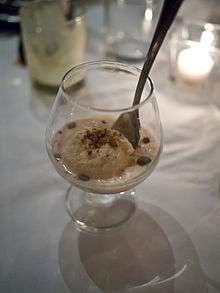Basundi
Basundi (Gujarati: બાસુંદી, Kannada: ಬಾಸುಂಡಿ, Marathi: बासुंदी, Tamil: பாசந்தி, Telugu: బాసుంది) is an Indian sweet mostly in Gujarat, Maharashtra , Telangana and Karnataka. It is a sweetened condensed milk made by boiling milk on low heat until the milk is reduced by half. In North India, a similar dish goes by the name rabri. It is often made on Hindu festivals such as Kali Chaudas and Bhaubeej (Bhai Dooj).
 Indian cheese dumpling in saffron | |
| Course | Dessert |
|---|---|
| Place of origin | India |
| Region or state | Tamil Nadu, Maharashtra, Gujarat, Karnataka, Telangana |
| Main ingredients | Milk, sugar, cardamom, saffron |
Different styles of basundi are also prepared, such as sitaphal (custard apple) basundi and angoor basundi (basundi with smaller kinds of rasgullas).
Preparation
Heavy cream may be added during the boiling process to hasten the thickening process. Once reduced, a little sugar, cardamom, charoli and/or saffron are added. Basundi is preserved well after sugar is added. Sugar develops some acidity over a period of time. If it is excessive, then it can curdle the basundi. Sometimes after adding sugar, one cooks it for some more time; this gives a nice pink color to basundi, as sugar is also cooked in milk turning into a light caramel. Before adding sugar, basundi is thick, but after adding, it becomes fluid again. Stirring well prevents malai from being formed on top and all guests (even late comers) can enjoy equally thick and plain basundi. Basundi is served chilled, often garnished with slices of almonds and pistachios.[1] Adding less saffron reduces colour intensity.[2] The addition of condensed milk gives a nice flavour and richness to basundi.[3]
How to Serve
Basundi can be served hot, warm or chilled. It is often served with puris (fried Indian flatbread).
References
- Dalal, Tarla. "Basundi ( Gujarati Recipe)". Tarladalal.com. Retrieved 16 May 2012.
- "Basundi recipe-Indian dessert recipes". www.chitrasfoodbook.com. 14 February 2014. Retrieved 20 April 2020.
- "Basundi Recipe - How to make basundi". 1 January 2015. Archived from the original on 4 January 2015.